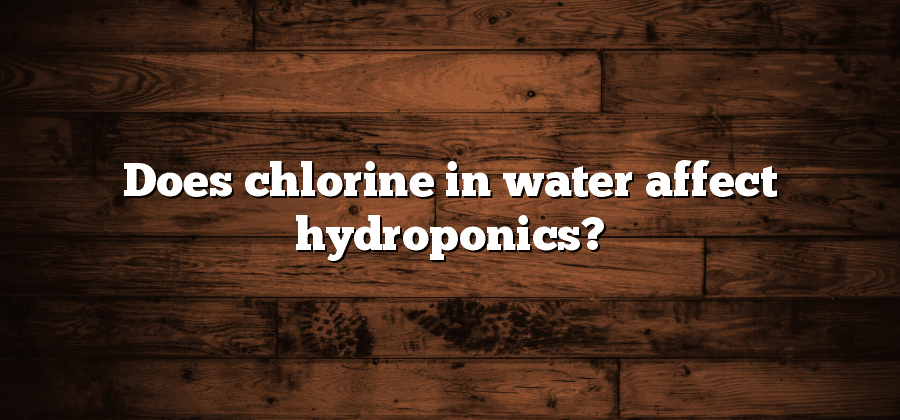The presence of chlorine in tap water and its impact on hydroponic plants
When it comes to hydroponic systems, the quality of water used can greatly impact the overall health and growth of plants. Tap water, which is commonly used in hydroponics, often contains chlorine as a disinfectant. While chlorine is essential for maintaining the safety of drinking water, its presence in hydroponic systems can have detrimental effects on plant health.
Chlorine can negatively influence the absorption of nutrients by hydroponic plants. It can alter the pH level of the water, making it more alkaline, which can hinder the availability and uptake of essential nutrients. This can result in nutrient deficiencies and stunted growth. Additionally, chlorine can directly damage the delicate root systems of hydroponic plants, compromising their ability to absorb water and nutrients efficiently. Consequently, the presence of chlorine in tap water necessitates careful management and treatment to minimize its impact on plant health in hydroponic systems.
Chlorine’s influence on nutrient absorption and plant growth in hydroponics
Chlorine, a commonly used disinfectant in tap water, has been found to have both direct and indirect influences on nutrient absorption and plant growth in hydroponics. Firstly, the presence of chlorine in the water can directly affect the absorption of essential nutrients by hydroponic plants. High levels of chlorine can hinder the uptake of nutrients such as nitrogen, phosphorus, and potassium, which are crucial for the healthy development and growth of plants. This inhibition of nutrient absorption can result in stunted growth and compromised plant health in hydroponic systems.
Additionally, chlorine indirectly affects plant growth in hydroponics by disrupting the balance of beneficial microbes in the growing medium. The chlorine present in tap water has the potential to kill or suppress the growth of beneficial bacteria and fungi that play a vital role in nutrient cycling and plant protection. These microorganisms support the availability and assimilation of nutrients, aiding in the overall health and vitality of hydroponic plants. With the disturbance of this delicate microbial ecosystem due to chlorine, the overall nutrient availability and uptake by plants may be impacted, further diminishing their growth potential.
In light of these implications, it becomes crucial for hydroponic growers to understand the relationship between chlorine levels and plant health in their systems. By implementing suitable chlorine removal methods, such as activated carbon filters or using dechlorination agents, growers can minimize the detrimental effects of chlorine on nutrient absorption and promote optimal plant growth in hydroponics. Further research and experimentation in this area are necessary to provide growers with comprehensive guidelines and strategies for effectively managing chlorine levels in hydroponic systems and maximizing plant growth potential.
Examining the detrimental effects of chlorine on beneficial microbes in hydroponic systems
Hydroponic systems rely heavily on a balanced microbial ecosystem to function optimally. These beneficial microbes play a crucial role in breaking down organic matter, converting nutrients into forms that can be readily absorbed by plants, and protecting against harmful pathogens. However, the presence of chlorine in tap water can have detrimental effects on these essential microbial populations.
Chlorine, a commonly used disinfectant in water treatment plants, is highly effective in killing harmful bacteria and viruses. Unfortunately, it does not discriminate between harmful and beneficial microbes, leading to a decline in microbial diversity and activity within hydroponic systems. The use of chlorinated water in hydroponics can result in a significant reduction in the populations of beneficial bacteria and fungi, thus disrupting the delicate balance of the system.
One study found that even low levels of chlorine had a noticeable impact on microbial abundance and diversity in hydroponic systems. The researchers observed a decrease in the presence of beneficial bacteria, such as **Bacillus** and **Pseudomonas**, which are known for their ability to enhance nutrient uptake and improve plant growth. Additionally, the researchers noted a decline in beneficial fungi, such as **Trichoderma**, which can help prevent the growth of harmful pathogens.
Overall, understanding and mitigating the detrimental effects of chlorine on beneficial microbes in hydroponic systems is crucial for maintaining a healthy and productive growing environment. Further research is needed to develop strategies that can effectively remove or neutralize chlorine from tap water without harming the delicate microbial balance. As hydroponic farming continues to gain popularity, finding solutions to this issue will be essential for sustainable and successful cultivation.
The relationship between chlorine levels and plant health in hydroponics
Chlorine, a common disinfectant used in municipal water treatment facilities, is often present in tap water. When using tap water for hydroponic systems, it is crucial to understand the impact of chlorine on plant health. Excess chlorine can hinder nutrient absorption and potentially lead to stunted growth or damage. However, it is important to note that not all plants respond in the same way to chlorine levels in the water.
In hydroponics, where plants rely solely on water and nutrient solutions for their growth, the presence of chlorine can impair the absorption of essential nutrients. Chlorine can disrupt the delicate balance of ions within the plant’s roots, affecting its ability to take up nutrients efficiently. Furthermore, the chlorine can interfere with the activity of beneficial microorganisms, such as mycorrhizal fungi or nitrogen-fixing bacteria, which play a vital role in nutrient uptake and overall plant health. The relationship between chlorine levels and plant health is complex and depends on various factors, including the specific plant species, its growth stage, and the concentration of chlorine in the water.






